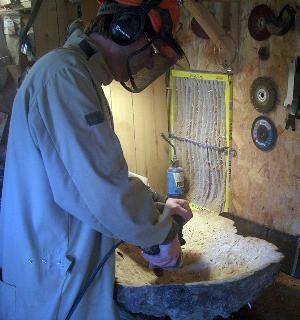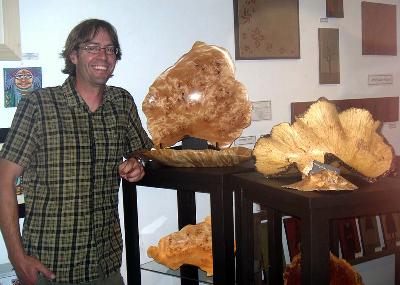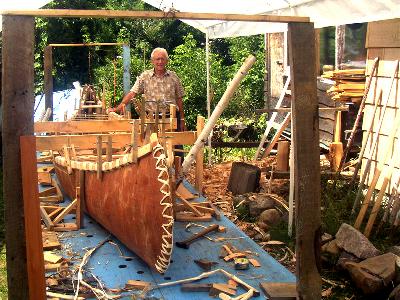 |
August 14, 2009Beautiful Burl Bowls and Birch
Bark Boats
|
Last week I mentioned the carved wooden bowls, dishes and
plates carved by Michael Mathieu. I went to see him at his home and studio on
Main Street downtown North Bay. I have admired his work at the Art on Main art
and fine crafts store many times, and had a lot of questions.
Mike told me that a burl is a bulbous growth on a tree produced by a variety of
possible causes. The tree cold be damaged, parasites could be at work, or
fungus or mould could be the villain. For details access Wikepedia under burl.
 |
Mike Mathieu at work on a bowl in his
studio -Doug Mackey photo |
Depending on the size of the burl it can be cut into boards, veneer, or can
be turned or carved to bring out the beauty of the incredible grain with
stunning curls, eyes and flames.
Mike originally tromped the bush for hours to find some burls and tried turning
them. He found the turning to be too mechanical and decided to carve them into
shapes dictated by their natural shape and preserving more of the quality of the
pieces. Since there are no courses on the craft he learned by trial and error.
The carving is a time consuming and risky business because so many things can go
wrong, but he learned quickly. Patience is required to get the wood dry
especially if from a live or recently fallen tree. Special power tools are
used and sandbags keep the bowl from moving (or a vice) while he works on it.
 |
Mike at his showcase at Art on Main in North Bay-Doug
Mackey photo
|
Hours of sanding by hand and machine eventually
bring up the shape and finish deserved. Special oil is applied followed by a
wax finish. The original edge of the bowl has the bark removed but remains
otherwise untouched.
Some of the pieces can be held in one hand while others are much larger and used
for decorative purposes or occasionally as a fruit bowl or salad bowl.
Mikeís studio has numerous burls of various sizes waiting for development. He
has begun to get commissions and he attends various craft shows such as the big
One of a Kind show in Toronto. He will attend his third show in Toronto in
November where he usually sells most of the many pieces he takes. He has shown
in Ottawa and Durham events as well. Locally Art on Main is close to home and
you can meet him there if you check their schedule. He takes his required shift
as a member of the co-op.
Mikeís business is called Northwood Creations and his website is
www.northwoodcreations.ca. He is also available at 705-495-6242 or at
Mikemathieu@sympatico.ca.
Building Birch Bark Canoes
I have written about the importance of the birch bark canoe in the development
of Canada in its early days. It is refreshing to see some able craftsmen,
mostly aboriginal men, continuing to build these technically unique vessels
using the original approach. Google birch bark canoes for many sites, books,
videos, courses, etc.
 |
Roger Labelle and his birchbark canoe-Doug
Mackey photo
|
While at the Voyageur Days event in Mattawa recently I met
Roger Labelle a Metis Mattawa businessman and trapper. When I was curator of
the Mattawa Museum 20 years ago I approached Roger to help set up a trapping
display which he did. I have met him over the years at aboriginal events and we
have talked about his connection with Daventry in Algonquin Park.
Roger suggested I drop by his house at the corner of ( 540 ) Bissett Street and
the newly named Anahareo Way to see his current birchbark canoe building
project. I went and saw a gorgeous canoe nearing completion (see photo of his
back yard.)
He described the process from getting the bark to harvesting the cedar and other
woods for all of the parts. The rope like strands used to bind the birch bark
made from the raw leather tree were all on display.
While there several other visitors arrived and had a look and saw the making of
the cedar lining and curved ribs to be inserted into the canoe. He showed
another finished canoe complete with the necessary sprucetar joints to prevent
leakage. Roger learned his canoe skills in various places including from
Charlie Lebarge and _Andy Green who built the voyageur canoe at the museum at
Samuel de Champlain Park.
Rogerís native instincts and pride have come through in an outstanding piece of
craftsmanship.
We talked about his son Marcelís canoe making and teaching ( I spent a day on
Marcelís trapline many years ago) and therein a tale worth telling Ė but I have
run out of my allotted space. Watch this space for a story of aboriginal
achievement worth hearing next week.
Heritage Perspective Home Page
|

![]() Past
Forward is now on Facebook "LIKE" us to keep in touch
Past
Forward is now on Facebook "LIKE" us to keep in touch